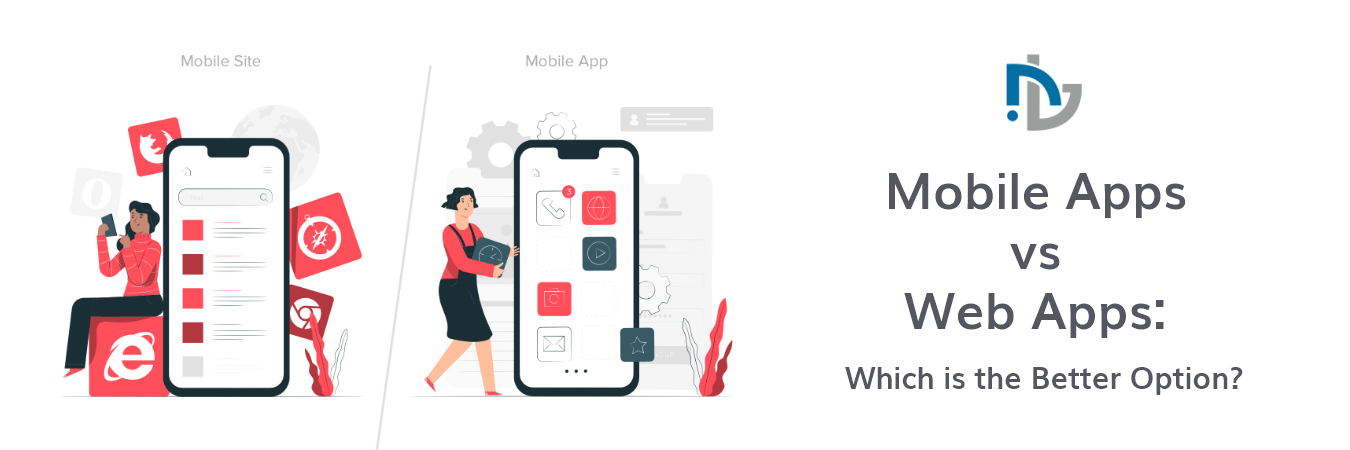As far as the procedure of mobile application development is concerned- native apps are a clear winner without a doubt. No development approach can play catch-up with the quality, experience, and output that the native app development approach renders. It says NO to every kind of compromise, which is generally witnessed by the businesses with other approaches like- hybrid approach, and web app development.
Aren’t you clear about the development approaches? Here’s the answer.
- Native app development
It involves building an app for a particular operating system like- Android and iOS, where distinct programming languages Java or Kotlin and Swift or Objective C are used. Various native tools, libraries, and resources are provided by both Google and Apple to create best-in-class native apps. The users can access the iOS and Android apps from different app stores- Apple store and Google play store.
- Hybrid app development
The cross-platform approach is used to build apps that perform well on both platforms- android and ios. The catch is the apps built for two platforms with the time, effort, and dollars investment of one app development. The hybrid apps possess the features of native apps and web apps as they can partially leverage hardware’s features. The hybrid apps are written in HTML, CSS, and JS and then wrapped in native environments. These apps are available on app stores from where the users can download and install them on their mobile phones.
- Web app development
These are platform-independent apps that can’t be downloaded from the app stores like- native apps and hybrid apps because they run in the browser. The user doesn’t require to download them on their mobile. Instead, just a stable internet connection and the app’s URL entered in the browser are enough to make the app run. They render the best UI and UX on every screen size without requiring the users to give some space on their mobile.
How is the Native App Better Than Web Apps?
- Speed- how the app performs?
The native apps are specifically built for one mobile device that makes an app- automatically a great fit to the device and thus performs flawlessly after the installation. For instance, when you buy and install an app from a Blackberry or iPhone application development company, it naturally turns into a piece of your handset. Propelling them on perfect handsets barely takes more than a couple of moments.
The web apps are internet-enabled apps which means the prerequisite is- stable internet connection. When the consistent connection is unavailable, the users can’t access and use the app impeccably.
- Cost Factor- which is expensive to build?
From expert app designers to the average Joe, everyone speaks the same thing, that’s- the mobile application development cost for native apps is altogether higher than that of the web-based ones. The native applications that are perfect over a few stages, specifically are reasonably expensive because the developers need to invest double time, efforts, and dollars in the native app development as opposed to web app development. The average time and cost required to make models of native apps are likewise higher. On the off chance that you lean toward native applications, you’ll need to hold up additional cost!
- Ease of Use- from the user’s perspective
According to specialists from the best iPhone or Android Application Development Company, both native apps and web apps can be easy to understand – although the former appears to have the edge here. That’s because most native applications coordinated with the phone camera, sound/video recorder, and other handset features. Apps downloaded from mobile websites are not liable to have this feature.
- App Store Approval is quite a task- yes or no?
A noteworthy point where web apps outscore the native mobile applications. For an engineer who is in to iPhone app development, it can take up to half a month, to get new applications approved and launched at the online app stores. And, after it’s all said and done, there is no certification that the app would gather adequate measures of clients’ advantage. On the other hand, the web applications don’t require such store approval as they are accessible from the mobile device’s web browser and are thus, simpler to advance.
- Security- it’s a worrying aspect for the users
Getting permeability on the app stores can be a somewhat time-expending process, and the technique works for native apps as well. People can rest assured with a mobile application, which has been protected by the several OS layers, quality-tested, and approved by the app store will be bug-free and entirely secure. No such affirmation is accessible for mobile web apps because there is no standardized quality control and no standardized SDKs and tools are used.
- Prerequisite of inward memory
Native applications require a specific, pre-determined measure of memory space in handsets – for working proficiently. That’s why so much importance is given to choosing a mobile application development system that would not increase data transmission excessively on smartphones. As web apps don’t acquire any additional memory space to be propelled and worked, their comfort is unquestionably higher on this tally.
- Finding the Essential Apps
With an array of web apps accessible, it can, at times turn out to be marginally precarious for clients to locate the ones that they require on their phones. There is no such thing with native mobile apps as the curated apps are listed and displayed on the Apple Play Store, Android store, and the Blackberry App World. Choosing and downloading native apps is commonly considerably less unwieldy than scanning for reasonable web apps.
- Maintenance- easier or difficult?
As native apps, by and large, require developers to write code separately for the app built on different platforms. It comes with challenges- maintaining the app for various platforms, and the maintenance effort gets multiply as the app ported to more platforms. With web app maintenance, the scene is completely different. They are easier to maintain as a common codebase is used across multiple mobile browsers. The maintenance cost figures for web applications, naturally, are additionally lower.
- Rendering the updates
The mobile apps need to be regularly upgraded with new features additions, modifications of existing ones, removing the undesired features, or improving UI/UX. When it comes to updating native apps, the apps need to update separately as unique coding is required for different platforms. Downloading the updates also require users to update the apps. The web app update by the users is too easy as the latest version is always accessible.
Conclusion- who wins the tug of the war?
At times, it tends to be hard to keep a tab on which version of a native app somebody is utilizing, which makes taking off redesign designs somewhat troublesome. As far as quality and execution, however, these native applications are superior to web apps. Everything considered native apps do appear to offer more client favorable circumstances – even though web apps additionally have a few positive purposes of their own.
We cannot declare a winner because both types of apps perform better than each other in different use cases. Decide your business app preferences, and then choose which one is the best fit for your business.
My two cents: If quality, reliability, security, and performance is your requirement, I suggest you move ahead with the native approach as no other development approach can out-pass native apps in these factors.








